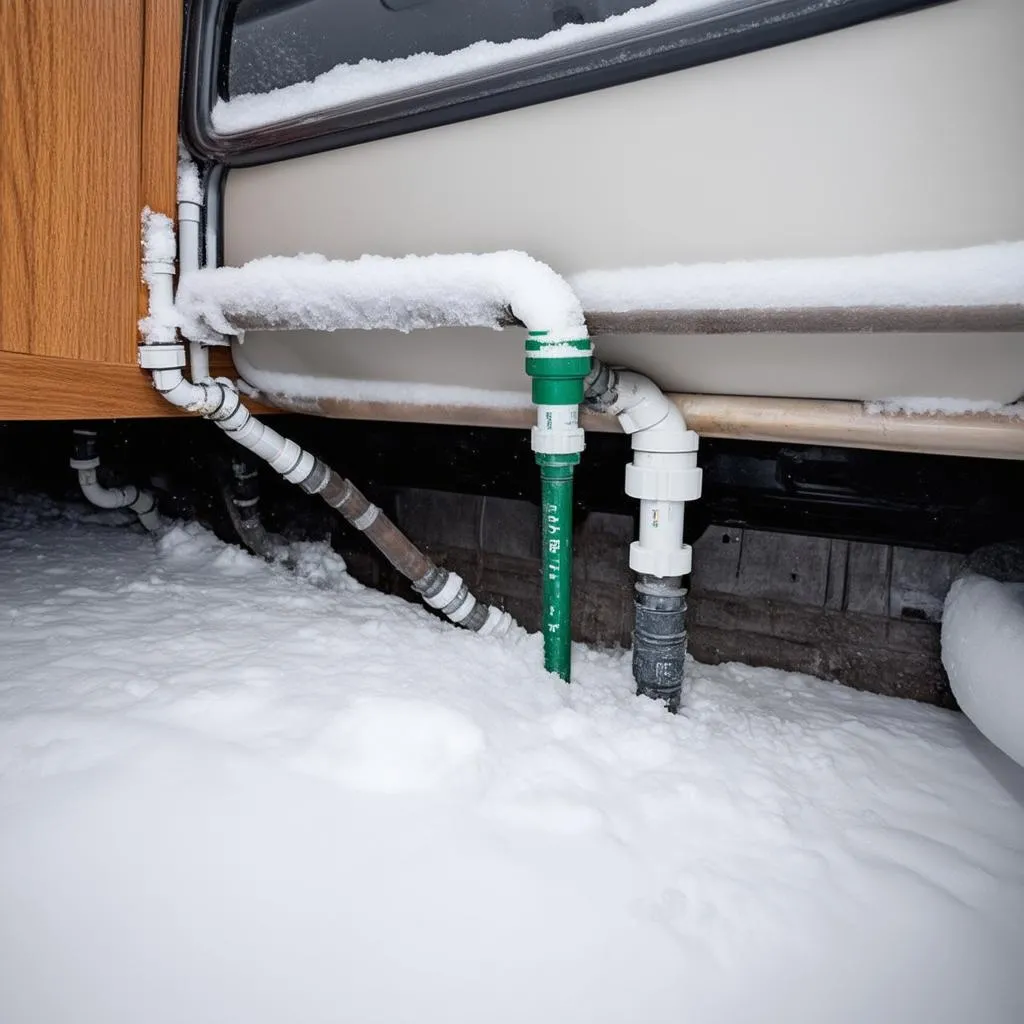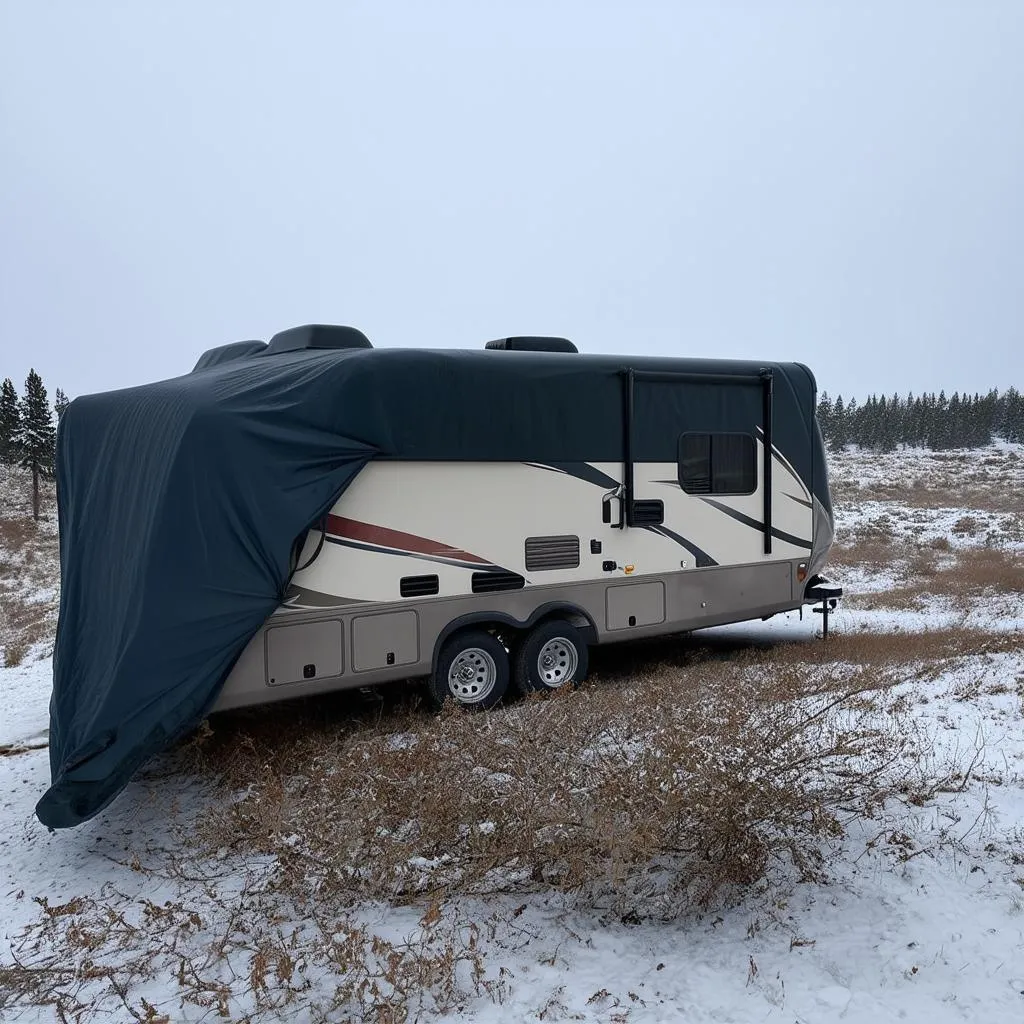“Home is where you park it” – a sentiment every travel trailer enthusiast lives by. But what happens when the open road calls even in the depths of winter? Fear not, intrepid explorers, for with a little preparation, your home-on-wheels can be prepped for frosty adventures or a cozy hibernation until spring thaws the path towards your next big adventure. This guide will equip you with the knowledge to winterize your travel trailer, ensuring it’s ready to hit the road when you are.
Why Winterizing Your Travel Trailer Matters
Imagine this: you’re nestled in the heart of a winter wonderland, sipping hot cocoa as snowflakes dance outside your window. Suddenly, a pipe bursts, flooding your mobile haven. This, my friends, is the nightmare scenario that proper winterization prevents.
Winterizing isn’t just about keeping your trailer warm; it’s about safeguarding its vital systems from the damaging effects of freezing temperatures. Water expands as it freezes, and this expansion can wreak havoc on your plumbing system, leading to costly repairs and ruining your travel plans.
 Burst RV Pipes
Burst RV Pipes
A Step-by-Step Guide to Winterizing Your Travel Trailer
Just like prepping your favorite hiking boots for a rugged trail, winterizing your travel trailer is about ensuring its durability and longevity. Let’s dive into the process:
1. Emptying and Cleaning: The First Line of Defense
- Water Systems: Drain your fresh water tank, water heater (make sure it’s cool before doing so!), and all pipes. Don’t forget to bypass your water heater to avoid damage during the antifreeze process.
- Thorough Flush: Use a non-toxic RV antifreeze to flush your water lines, ensuring it reaches every faucet and fixture.
- Appliance Attention: Winterize appliances like your washing machine and dishwasher according to their manufacturer’s instructions.
- A Sparkling Finish: Give your trailer a thorough cleaning inside and out. A clean trailer is less likely to attract pests looking for a warm winter haven.
2. Protecting Your Interior: Cozy and Pest-Free
- Food Storage: Remove all food items to prevent unwanted critters from setting up camp.
- Moisture Control: Leave cupboard doors slightly ajar to promote air circulation and prevent mold and mildew. Place moisture absorbers in strategic locations.
- Window Treatments: Close blinds and curtains to protect the interior from the sun’s rays, which can cause fading even in winter.
- Pest Prevention: Seal any cracks or gaps where critters might try to sneak in. Consider placing natural pest deterrents inside.
 Winterized RV in Snow
Winterized RV in Snow
3. Exterior Care: Shielding Your Home-on-Wheels
- Tire Protection: Cover your tires to protect them from UV damage. Consider using tire covers or placing plywood underneath.
- Sealing Out the Elements: Inspect and reseal windows and seams to prevent drafts and leaks.
- Roof Maintenance: Clear any debris from the roof and check for any damage. A small leak can turn into a major issue during winter.
- Battery Care: Remove your battery and store it in a cool, dry place. Keep it charged throughout the winter months.
Choosing the Right Antifreeze: A Critical Decision
Using the correct type of antifreeze is crucial. Never use automotive antifreeze, as it’s highly toxic and can contaminate your water system. Opt for a non-toxic RV or marine-grade antifreeze that’s specifically designed for potable water systems.
Seeking Professional Help: When in Doubt, Call the Experts
If you’re uncomfortable with any part of the winterization process, don’t hesitate to seek help from a qualified RV technician. They have the expertise to ensure your travel trailer is properly protected. Many RV service centers, like those you might find near popular destinations like Yosemite National Park or the Grand Canyon, offer winterization services.
FAQs: Your Winterizing Questions Answered
Q: How often should I run my RV engine during winter storage?
A: It’s generally recommended to run your RV engine for 15-30 minutes every two weeks. This helps circulate fluids and prevents seals from drying out.
Q: Can I use my travel trailer for winter camping?
A: Absolutely! Winter camping in your RV can be a magical experience. However, it requires additional preparations, such as insulating your pipes, using heated water hoses, and investing in a reliable heating system.
Q: How can I find a reputable RV service center for winterization?
A: Websites like travelcar.edu.vn offer valuable resources and directories to help you find trusted RV service centers near you.
Embracing the Open Road, No Matter the Season
By following these winterization steps, you can ensure that your travel trailer remains in top shape, ready to embark on new journeys when the warmer weather beckons. Remember, a little preparation goes a long way in protecting your investment and ensuring years of memorable adventures.
For more travel tips, destination guides, and resources to enhance your RV adventures, visit travelcar.edu.vn. Safe travels and happy camping!